July 10th, 2016 by geoffhodgson1946

“A thoughtful analysis of Labour’s current impasse – back to 1918 in more senses than one”
Niamh Hardiman, Professor of Political Science and Public Policy, University College Dublin
Geoffrey M. Hodgson
Tony Blair and Jeremy Corbyn have been pulling Labour in different directions for decades. But under the surface there are some common roots in their thinking. Also Blair created some of the circumstances in which Corbyn was decisively elected as Labour Party Leader in 2015, with 59.5 per cent of the vote.
Both Blair and Corbyn have enjoyed huge support among Labour members. How could this radical transformation of political opinion take place within a large political party, in the space of less than 20 years?
To answer this question we must first briefly examine how Labour evolved from 1945 to 1979, as a mass party based on strong trade unions. Then came the earthquake of Margaret Thatcher’s election victory in 1979. Labour was defeated in three subsequent elections, before Tony Blair led Labour into power for thirteen years. Blair had help to make Labour electable by combining a reforming momentum with a pro-business image, but he did not provide an adequate political philosophy to replace traditional socialism.
This vacuum, combined with the disastrous invasion of Iraq in 2003, and Labour’s part in the financial crash of 2008, created the conditions for the election of Jeremy Corbyn as leader in 2015. Corbyn turned Labour’s ideological clock back by over half a century and lost its prospect of electability.
Post-War Labour: The Broad Church
After the first majority Labour government was elected in 1945, Labour party individual membership was rising rapidly towards one million and trade union membership began a long upward trend, rising from about 8 million in 1945 to 13 million in 1979. In general elections from 1945 to 1979 inclusive, Labour always polled between 36 per cent and 49 per cent of the vote. Labour was a mass party, built on the pillars of organised individual membership, powerful trade union support, a strong presence in parliament, and the loyalty of over a third of the electorate.

Clement Attlee
Labour’s commitment to widespread common ownership was enshrined in Clause Four of its constitution, which had been adopted in 1918. Before he became Prime Minister in 1945, Clement Attlee had expressed his support for this full-blooded socialist vision of a planned economy with widespread public ownership. But the practicalities of government, and the outbreak of the Cold War in 1948, pushed Labour leaders and intellectuals towards social democracy and a mixed economy. The most important statement of this shift was Anthony Crosland’s The Future of Socialism in 1956.
But, despite the efforts of Hugh Gaitskell and others, Labour’s Clause Four remained unchanged. Labour contained both classical socialist and social-democratic currents. But the socialist wing never achieved supremacy, largely because it had insufficient support among the trade unions that were affiliated to the party. The great union flywheel kept Labour on a social-democratic course. The first-past-the-post electoral system made a party split and a socialist breakaway unviable.
The Thatcher Era: From Multiple Defeats to Recovery
The 1979 defeat of the Labour Government under James Callaghan brought Margaret Thatcher to power and an ensuing 18 years of Tory rule. At first, in reaction to this defeat, the traditional socialist wing of the party made gains under the leadership of Tony Benn. In 1980, Michael Foot, a radical social democrat, was elected as party leader. In 1981, Dennis Healey narrowly defeated Benn for the Deputy Leadership. In frustration with Labour’s shift to the Left and the use of union block votes, a sizeable portion split off to form the Social Democratic Party.
Labour’s 1983 general election manifesto prescribed a good dose of nationalisation, an interventionist industrial policy, unilateral nuclear disarmament, higher personal taxation and withdrawal from the European Economic Community (now the European Union). Tested at the polls, Labour’s vote slumped below 28 per cent, for the first time since 1918.
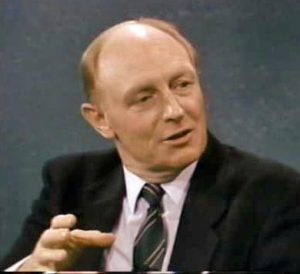
Neil Kinnock
Then Foot resigned. Neil Kinnock was elected as leader, beginning the long process of making Labour electable once again. Kinnock fought the Marxist entryists in the party, modernised its policies on vital issues such as home ownership, and made it more credible.
Meanwhile, Thatcher continued her assault on Labour’s trade union base. A series of restrictive laws reduced trade union powers. By the time that Labour regained power in 1997, trade union membership had been reduced by more than a third. Today, trade union membership is less than half what it was in 1979, notwithstanding a bigger workforce.
The Blair Revolution: From Socialism to Undeclared Liberalism
The long period in opposition from 1979 to 1997 convinced a majority of Labour members that principle was impotent without power, and that some compromises were necessary to make Labour electable. In this climate, Tony Blair was elected as party leader in 1994.
The term ‘New Labour’ separated the party from its previous electoral baggage, including its original primary focus on common ownership and its antagonism to private business. Blair argued that previous socialists had confused means with ends. The desired end was a society in which all individuals would be valued and had the means of self-fulfilment. If common ownership had been a means that end in the past, then it was no longer appropriate for the modern, complex, global economy.
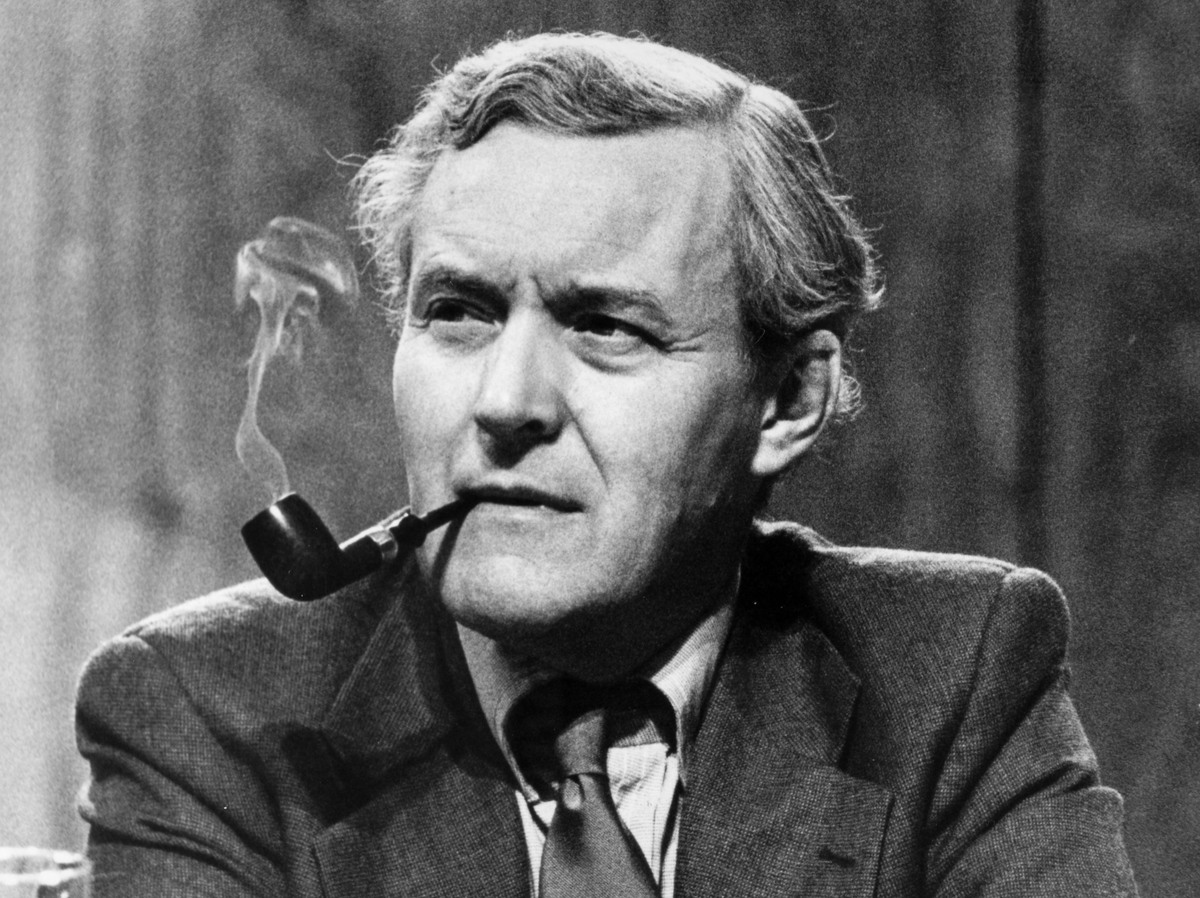
Tony Benn
In 1995 Blair successfully removed Labour’s commitment to ‘common ownership’ from Clause Four of its constitution. But from the Left, Tony Benn protested: ‘Labour’s heart is being cut out’. In a sense Benn was right, common ownership had been Labour’s core principle since 1918, even if no leader since 1945 had made it a primary goal.
Blair hyphenated the word as ‘social-ism’ and attempted to change its meaning. It now meant a recognition of individuals as socially interdependent, the promotion of social justice and of equality of opportunity, recognising the equal worth of each citizen. He also used the term ‘third way’ to describe a path that differed from widespread collectivisation, on the one hand, and unrestrained markets, on the other.
While Blair saw a sizable role for the market, he was not a ‘neoliberal’ or a free-market libertarian. The state was still to play a major role in the economy. But redistributive taxation and the reduction of inequality were not major priorities. Blair’s close ally Peter Mandelson declared in 1998 that the Labour Government was ‘intensely relaxed about people getting filthy rich as long as they pay their taxes’.

Thomas Paine
While Blair redefined and retained the word social-ism, he moved Labour closer to a version of social liberalism. There is a radical tradition of social liberalism, but it is not socialist in the sense of widespread common ownership. The good of the community is seen as harmonious with the freedom of the individual. This tradition stretches from Thomas Paine through John Stuart Mill to Thomas H. Green, John A. Hobson and others.
From Paine onwards, social liberals raised concerns about inequalities of wealth and power. They appreciated the complexity of decision-making and the potential fallibility of government. Hence they advocated flexibility: there was a need for policy experiments and ongoing appraisals. Institutional checks and balances were required. But for Blair it was all about ‘values’, not structures or institutions.
Labour’s nostalgic devotion to the word socialism was too strong. With or without the hyphen, social-ism had become a zombie-term – a mere badge of identity. Labour was still stuck in its old rhetoric and unable to learn much from the broad liberal tradition.
Blairism as Marxism turned Upside-Down
The relationship between means and ends is important. Marxism famously separates ends from means, claiming that ‘the ends justify the means’. For Marxism, all means are evaluated solely in terms of the ends that they are deemed to serve. But in a complex world, we cannot be sure that specific means will lead to their assumed ends. Hence, contrary to Marxism, means must be placed under moral constraints as well.
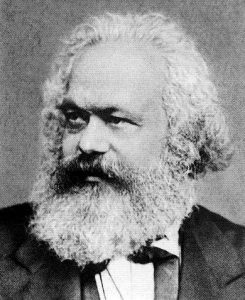
Karl Marx
Blair argued that the emphasis on common ownership or nationalization confused means with ends. The ends of social harmony and social justice, for example, might be achieved by means other than common ownership. Ironically, by separating means and ends so completely, Blair mirrored Marxism. Blair used a Marx-like separation of ends from means to abandon classical socialist aims.
But means and ends cannot be completely separated. The American philosopher John Dewey pointed out that the pursuit of goal is itself a learning process that can modify our ends. Furthermore, the use of particular means might modify our ends, as we discover unforeseen problems or benefits. Furthermore, the end we uphold is a spur to action, hence also a means of energizing change. Dewey wrote: ‘there is no end which is not in turn a means’.
Blair adopted another dichotomy from Marxism. This is the separation of the sphere of ‘values and beliefs’ from economic structures and patterns of ownership. This is redolent of Marx’s distinction between the ideological ‘superstructure’ and the ‘economic base’. But Blair reversed their importance: for him ‘values and beliefs’ assumed primacy. Adopting the same dichotomy, Marxism was turned upside-down.
This Marxist dichotomy is false. All economic activity involves beliefs, evaluations and value-laden motivations. Values and beliefs are intrinsic to the economy. The economy is not a machine that can be considered separately from the knowledge, beliefs and expectations of the human agents within it.
Blair in Power: From Achievement to Catastrophe
Blair’s highly charismatic and effective leadership led to the electoral landslide of 1997. Labour’s share of the vote jumped from 34.4 per cent in 1992 to 43.2 per cent in 1997. Especially in the early years, his government achieved a great deal. Education and the National Health Service benefitted for large increases in spending.
One of the first major achievements of Blair’s government was the Good Friday Peace Agreement in Northern Ireland. A minimum wage was introduced and devolved assemblies were set up in Scotland and Wales. The Human Rights Act was passed in 1998, but the Blair government was later accused of complicity in human rights abuses abroad. There was important legislation in pursuit of gay rights. Child and pensioner poverty were dramatically reduced. There was continuous economic growth. Many more people were brought into employment.
Blair won another landslide election in 2001. Demonstrably, by a wide margin, he had made Labour electable, after the wilderness of the Thatcher era. But he did not offer Labour a new philosophy or a robust architecture, after the abandonment of traditional socialism and the decline of its trade union base. Even before Iraq, some of his new policies were challengeable.
 For example, Blair’s emphasis on ‘values and beliefs’ over institutional structures allowed him to privatize some public services, including parts of the National Health Service. His claim was that the same esteemed values could endure within any system of ownership. But changes to institutional structures affect the habits and beliefs of those involved. Extending the scope for contracts and markets means – rightly or wrongly – that pecuniary and profit-orientated values can become more pervasive, unless checks are put in place.
For example, Blair’s emphasis on ‘values and beliefs’ over institutional structures allowed him to privatize some public services, including parts of the National Health Service. His claim was that the same esteemed values could endure within any system of ownership. But changes to institutional structures affect the habits and beliefs of those involved. Extending the scope for contracts and markets means – rightly or wrongly – that pecuniary and profit-orientated values can become more pervasive, unless checks are put in place.
Consistent with his emphasis on ‘values and beliefs’, Blair promoted a programme of expansion of publicly-funded faith schools. But religious faiths are not simply ‘values’: they are organised enclaves of group self-protection and survival. As already evident from the long experience of segregation in Northern Ireland, institutionalised separation can exacerbate political, ethnic and cultural divisions.
A 2001 report commissioned by Bradford City Council concluded that its communities were becoming increasingly isolated along racial, cultural and religious lines, and that faith-segregated schools were fuelling the divisions. Major riots erupted that year in Bradford and other northern cities.
 David Bell – the then Chief Inspector of Schools – warned in a January 2005 speech to the Hansard Society that a traditional Islamic education did not equip Muslim children for living in modern Britain. He said: ‘I worry that many young people are being educated in faith-based schools, with little appreciation of their wider responsibilities and obligations to British society.’ In another lecture Bell said: ‘We can choose … whether we want to bring our diversity together in a single rainbow or whether we allow our differences to fester into separate cultures and separate communities.’ Yet, even after the July 2005 London bombings by home-grown Islamic extremists, and until his resignation from office in 2007, Prime Minister Blair continued to promote faith schools.1
David Bell – the then Chief Inspector of Schools – warned in a January 2005 speech to the Hansard Society that a traditional Islamic education did not equip Muslim children for living in modern Britain. He said: ‘I worry that many young people are being educated in faith-based schools, with little appreciation of their wider responsibilities and obligations to British society.’ In another lecture Bell said: ‘We can choose … whether we want to bring our diversity together in a single rainbow or whether we allow our differences to fester into separate cultures and separate communities.’ Yet, even after the July 2005 London bombings by home-grown Islamic extremists, and until his resignation from office in 2007, Prime Minister Blair continued to promote faith schools.1
Blair’s government reduced the number of heredity peers in the House of Lords, but dithered on further reform. Whether the House of Lords should be fully appointed, fully elected, or be subject to a combination of the two remained under dispute. Blair worried that the House of Lords might impair the will of the Commons – institutionalised checks and balances were not central to his thinking.
Then there was the catastrophe of the 2003 invasion of Iraq. Blair was over-confident that his ‘values’ could prevail, and President George W. Bush could be persuaded to seek United Nations approval. But these ‘values’ were no match for a belligerent Republican Party.
Of dubious legality, this bloody disaster wrecked Blair’s political career. Deadly strife in Iraq continues to this day, with enduring political reverberations in the UK.
 Blair’s motivation for his decision to support Bush’s invasion will be the subject of many biographies and histories to come. The explanation is bound to be complex, but I guess that Blair’s supreme emphasis on ‘values’ over legalities, structures, evidence, fallibilities and practicalities will be uppermost. How else could someone believe in the possibility that Western democratic ideals could quickly take hold in an artificially-created country with no democratic history, riven by ethnic and religious division and fragmented into countless clans?
Blair’s motivation for his decision to support Bush’s invasion will be the subject of many biographies and histories to come. The explanation is bound to be complex, but I guess that Blair’s supreme emphasis on ‘values’ over legalities, structures, evidence, fallibilities and practicalities will be uppermost. How else could someone believe in the possibility that Western democratic ideals could quickly take hold in an artificially-created country with no democratic history, riven by ethnic and religious division and fragmented into countless clans?
Blair was an outstanding politician: he restored Labour’s electability and won three major victories in succession. But when he stepped down from office in 2007 he left an ideological as well as a charismatic vacuum. Labour retained the term socialism, but in substance Blair moved Labour toward an untutored version of reforming liberalism. Largely because of the damage to Blair’s reputation after Iraq, the party was unable to digest this ideological shift.
Blair compounded a problem faced by social democratic parties throughout the world. To a large extent they have lost their way, lacking a well-developed ideology with related, viable goals.
The Corbyn Restoration: Marxism-Leninism Revived
After Blair’s exit, the theoretical, ideological and charismatic void helps to explain why the Labour Party eventually choose the retro-Marxist Jeremy Corbyn as its leader.2 Furthermore, the weakened trade unions were no longer a moderating force: the flywheel had been dismantled. Constitutional changes had given them less power within Labour’s structure and the power they retained had been moved by internal changes to the Left.
The financial crash of 2008 undermined Labour’s reputation for sound finance. When Gordon Brown was Labour Chancellor under Blair, he promoted significant deregulation of the financial sector. After the debt bubble burst, and Western capitalism teetered on the edge of collapse, there was a widespread resurgence of Marxist thinking.
Corbyn turned the clock back, returning to socialism in its original meaning. The goal of common ownership was restored. His semi-Marxist, Bennite socialism was combined with a quasi-Leninist foreign policy. Opposed to the invasions of Afghanistan and Iraq, and to the oppressive treatment of Palestinians by Israel, Corbyn’s foreign policy became systematically anti-West. Corbyn turned Marxism the right way up.
 As if oblivious to the enormous changes in world capitalism, Corbyn clings to an ideology made in 1918. There is neither strategy, detail nor appraisal of feasibilty, to his thinking. All that is left is his ‘values’: his outrage and protest against forces from the West that inflict suffering on the world. There is no mention of the many millions that have died under regimes that were ‘Marxist-Leninist’ by name.
As if oblivious to the enormous changes in world capitalism, Corbyn clings to an ideology made in 1918. There is neither strategy, detail nor appraisal of feasibilty, to his thinking. All that is left is his ‘values’: his outrage and protest against forces from the West that inflict suffering on the world. There is no mention of the many millions that have died under regimes that were ‘Marxist-Leninist’ by name.
Although very different from Blair’s, Corbyn’s ideology faces the same problem of dealing with the potential fallibility of all decisions and policies. Both Blair and Corbyn proceeded as if they had the uncontroversial right answer to any problem. Yet the complexity of the modern world underlines the need for an experimental approach to policy, and for countervailing institutional structures to appraise every move.
Unlike Blair, Corbyn believes that these problems can be solved by large doses of democracy and popular involvement. But he overlooks the problems and dangers of undetailed ultra-democracy. Widespread democratic involvement in the myriad of intricate decisions in a complex politico-economic system is unworkable.
While Blair after 2003 carried the scars of Iraq, Corbyn is on record in his support for terrorist organisations such as Hamas, Hezbollah and the IRA. He has claimed that he was engaging in the peace processes in these theatres of combat. But there was no visible negotiation with the other sides in these conflicts. Corbyn has also given speeches supporting Colonel Muammar Gaddaffi’s regime in Libya and Slobodan Milosevic, the butcher of Bosnian Muslims. Corbyn’s behaviour was more consistent with an ‘anti-imperialist’ and anti-West Leninist than with a broker for peace.
In 1918, Labour first established individual party membership and the ‘common ownership’ Clause Four was first placed in its constitution. Corbyn’s Leninism would take us back to the year after Lenin and the Bolsheviks seized power in Russia. Momentum yes – but backwards in time. Over a hundred years of hard work by millions of activists, building Labour as a political movement and as a party of government, will be reversed.
Corbyn’s political brew has little chance of success. But we should understand the unwitting role of Blair in helping to prepare the ground for its ascendancy within the Labour machine.
Conclusion: Beginning Again
Values are important, but we need more than that. While conservatives can nod in favour of the status quo, radicals must offer a distinctive vision for change – they have to outline the kind of future they want. A movement to change the world must uphold its aims and recruit to its cause.
Changed under Blair’s leadership, the current Labour Party Constitution outlines commendable principles such as by ‘common endeavour we achieve more than we achieve alone’. It laudably aims for a society where ‘power, wealth and opportunity are in the hands of the many not the few’ and ‘where we live together freely, in a spirit of solidarity, tolerance and respect’.
But these words are too vague to provide a clear goal. They are consistent with a range of idealistic plans, from statist socialism to egalitarian ‘people’s capitalism’.
The current Clause Four Part One is silent on the question of property, whether it is to be private or owned in common. Reference to ‘a thriving private sector’ is tucked away in Part Two, alongside a mention of public ownership or accountability where ‘essential to the common good’.
This unmotivated melange satisfies neither traditional socialists who see common ownership as a vital goal, nor liberals who regard some private ownership as one of the preconditions of human freedom. Clause Four is inaudible on these vital institutional questions. ‘Values’ fill the vacuum instead.
Clause Four commendably promotes democracy and human rights, but is unclear about the institutional and politico-economic conditions under which they are nurtured. It does not acknowledge one of the major lessons of the twentieth century, that human rights and traditional socialism have never co-existed, and there are good reasons to conclude that they never will.
The institutional aims of the Labour Party are unclear. There is now a battle for the stricken party’s soul. It will be fought out between traditional socialists and social-democratic modernisers. But it will be a fight over an organisation that has already lost its direction and has no clear way forward. Both Blair and Corbyn bear some responsibility for this crisis.
10 July 2016
Amended: 11-13 July 2016, 18 February 2019.
1 Like Blair, Corbyn also supports faith schools (at least Jewish ones).
2 Pressed by Andrew Marr in July 2015 on whether he was a Marxist, Corbyn ducked the opportunity to deny on television that he held to that view.
Bibliography
Attlee, Clement R. (1937) The Labour Party in Perspective (London: Gollancz).
Bell, David (2005) ‘Full Text of David Bell’s Speech’, The Guardian, 17 January. http://www.theguardian.com/education/2005/jan/17/faithschools.schools
Blair, Tony (1994) Socialism, Fabian Pamphlet 565 (London: Fabian Society).
Bloodworth, James (2015a) ‘A Left-Wing Case against Comrade Jeremy Corbyn’, International Business Times, 4 August. http://www.ibtimes.co.uk/james-bloodworth-left-wing-case-against-comrade-jeremy-corbyn-1513969
Bloodworth, James (2015b) ‘Why is No One Asking About Jeremy Corbyn’s worrying connections?’ The Guardian, 13 August. https://www.theguardian.com/commentisfree/2015/aug/13/jeremy-corbyn-labour-leadership-foreign-policy-antisemitism
Bloodworth, James (2015c) ‘The Bizarre World of Jeremy Corbyn and Stop the War’, Politico, 12 November. http://www.politico.eu/article/bizarre-world-of-jeremy-corbyn-and-stop-the-war-coalition-galloway-rees-iraq-far-left/
Boffey, Daniel (2016a) ‘Hilary Benn Seeks Shadow Cabinet Backing to Oust Corbyn’, The Guardian, 23 June. http://www.theguardian.com/politics/2016/jun/25/hilary-benn-jeremy-corbyn-labour-leadership-eu-referendum-brexit
Boffey, Daniel (2016b) ‘Jeremy Corbyn aides refuse Tom Watson one-on-one meeting’, The Guardian, 3 July. http://www.theguardian.com/politics/2016/jul/02/corbyn-keeps-watson-arms-length
Crosland, C. Anthony R. (1956) The Future of Socialism (London: Jonathan Cape).
Dewey, John (1922) Human Nature and Conduct: An Introduction to Social Psychology (New York: Holt).
Gillard, Derek (2007) Never Mind the Evidence: Blair’s Obsession with Faith Schools www.educationengland.org.uk/articles/26blairfaith.html.
Lukes, Steven (1985) Marxism and Morality (Oxford: Oxford University Press).
Rentoul, John (1995) ‘“Defining Moment” as Blair wins Backing for Clause IV’, The Independent, 27 April. http://www.independent.co.uk/news/defining-moment-as-blair-wins-backing-for-clause-iv-1611135.html
Trotsky, Leon D., Dewey, John and Novak, George (1979) Their Morals and Ours: Marxist versus Liberal Views on Morality (New York: Pathfinder Press).
Posted in Common ownership, Democracy, Jeremy Corbyn, Labour Party, Left politics, Nationalization, Politics, Socialism, Tony Benn, Tony Blair, Tony Blair
June 30th, 2016 by geoffhodgson1946
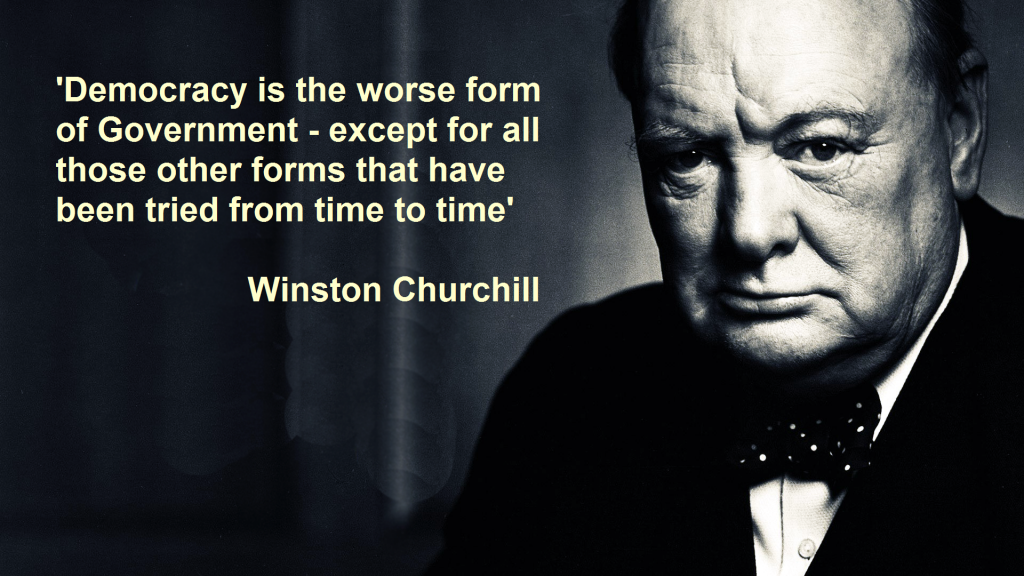
Geoffrey M. Hodgson
UK politics is currently in turmoil, as a result of the vote for Brexit on 23 June 2016. Should a narrow referendum result be implemented by the government, or should Parliament alone make the final decision? The constitutional position is that Parliament is sovereign. But many insist that even a narrow result should automatically be respected. To do anything else would be ‘undemocratic’ – and therefore wrong.
Within days of the referendum, the Parliamentary Labour Party passed a decisive vote of no confidence in Jeremy Corbyn as its leader.
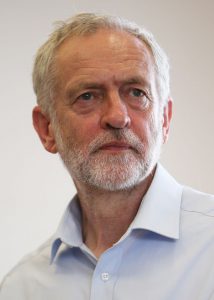
Jeremy Corbyn
Corbyn is a ‘democratic socialist’, believing in a large public sector under some form of ‘democratic control’. His speeches and writings are silent on the detail on how this would work. We find a tiny bit more in the publications of his late mentor – Tony Benn. Benn argued that the essence of socialism was democracy, not simply in parliament, but in the economy and all civic life.
This is not a new idea. Vladimir Lenin wrote in 1917 in his State and Revolution of ‘an immense expansion of democracy’ (which of course was the reverse of what actually happened after he seized power).
G. D. H. Cole was a Fabian and Labour Party socialist. His vision of ‘guild socialism’ was of an integrated, national system where ‘a single authority is responsible both for the planning of the social production as a whole and for the distribution of the incomes which will be used in buying it.’ Within this ‘single authority’ he also sought devolved worker control, where groups of individuals would make democratic decisions on how production was organised and products were distributed.

Tony Benn
The superficial attraction of this kind of thinking is immediate. The Corbyns of today, the Benns of yesterday and the Coles of the day before, all pointed to the towering concentrations of capitalist power and wealth that overshadow the festering estates of the poor. ‘Make it all democratic’ they say, ‘let the public own, and decide upon, what is to be done with the banks, railways, enterprises, and all the rest. This is just democracy in action.’
But there are grounds to hesitate. Leaving aside the issue of public ownership, democracy is not a solution to every problem. Furthermore, there are logical, practical and even ethical arguments against an indefinite extension of democracy. There are very good reasons to be in favour of democratic government. But the limits to democracy should also be acknowledged.
Absolutism refers to a form of undemocratic and unaccountable government. Absolutism also refers to the idea that a principle or standard should be all-encompassing or supreme. In the latter sense, some people are democratic absolutists. I offer an explanation why they are wrong. If you feel uncomfortable with this ironic conjunction of meanings, then you may substitute with something like ‘ultra-democracy’ instead.
First I outline some well-known logical problems with ultra-democracy (you may skip this section if you are more interested in practicalities). I then point to some practical problems with ultra-democracy. I end up defending representative democracy.
Logical problems with democracy
It is very easy to show that the absolute democratisation of every important decision is impossible. A decision cannot be made democratically without prior rules on how the vote is to be conducted. How is the proposal tabled? Who can vote? What system of voting is used? Can the proposal be amended? And so on.
That is why states or organisations have constitutions or standing orders, which hopefully can deal with these issues. Some of these ground rules – such as the constitution itself – may have previously been put to the vote. But then too some rules were assumed, concerning the way that vote was conducted. Often the choice of those rules were crucial for the outcome. But it is logically impossible to have a vote on every prior rule that is necessary for a vote to take place. It’s an example of an infinite regress.

Nicolas de Condorcet
Another intractable logical problem is the paradox of voting, as first explained by the French revolutionary Nicolas de Condorcet (1743-1794). Condorcet showed that while individuals themselves may have consistent preferences over different outcomes, when brought together in a population the collective expressions of those preferences may be inconsistent. Jonathan Portes has illustrated this neatly in the Brexit case. Attempts to deal with this problem – such as two-stage voting, as in French Presidential elections – are both fallible and dependent on prior choices of rules.
There is also the Arrow impossibility theorem, named after the Nobel economist Kenneth Arrow. His theorem states that no rank-order voting system can be designed that always satisfies these three reasonable criteria of fairness. I do not need to go into further details here. The overall point is that all attempts to implement democracy are inevitably incomplete, involve prior assumptions that cannot be voted upon, and may violate some principles of consistency or fairness.
Practical problems with ultra-democracy
Major practical problems with ultra-democracy stem from the complexity and scale of modern society. A small club or group can run things relatively easily. But even then, special skills are required, such as being able to keep accounts or chair meetings.
Making decisions and managing human interactions in a large-scale society is immensely more complex. Personal familiarity and trust remain vital at the family and small community level, but with decisions involving thousands and millions of people, something else is required. There has to be some kind of government, of one kind or another, based on some form of authority.
Consider the ‘democratic control’ of industry, favoured by Cole, Benn and Corbyn. Worker cooperatives are a workable and meritorious alternative to capitalist corporations. But even here, only a tiny proportion of decisions can be delegated to ballots or mass meetings. The complex processes and technologies of production have to be broken up into manageable units. The advice of experts has to be relied upon.
In addition, a lot of decision-making has to be devolved. We are no longer a world where the role of an office secretary is simply to take down shorthand and type it out. A great deal of work involves processing information and making judgements, even at lower management levels. Think how many small judgements are made at work each day. It would be impossible to be ‘democratic’ and put them to the vote.
Greater industrial democracy, with worker participation in some workplace decisions, can improve productivity and make work more enjoyable. Moves in this direction are important and valuable. But it is impractical to have votes on more than a tiny fraction of the important decisions that have to take place every day in any large, complex economy.
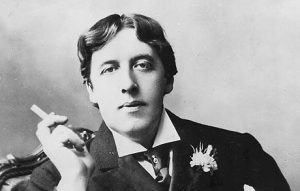
Oscar Wilde
Everyone’s participation in every major decision, even if limited to a town or region, would be a crushing burden of endless decision-making on every citizen. It would guarantee economic paralysis. Oscar Wilde was right: socialism is impossible because it would take too many meetings.
Supporters of an ultra-democratic society, where individuals make decisions throughout industry as well as the polity, fail to consider the problems of relevant knowledge and the sheer number of meetings and decisions involved. That is why, contrary to the claims of many socialist ultra-democrats, private ownership and control are necessary to a large degree, so that producers and consumers can make decisions (within legal limits) through contracts and markets, unencumbered by local or national committees and their inevitable bureaucracies.
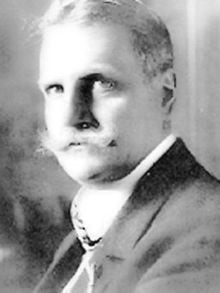
Robert Michels
Robert Michels (1876-1936) was a student of Max Weber. He argued persuasively that full democratic control was impossible in large-scale, complex organizations. For individuals to coordinate and act together, sizeable organizations need leaders, who then delegate administrative tasks to complex bureaucracies. Leaders and bureaucrats manage information flows between members of the organization. They develop skills, and acquire expertise and knowledge, that are peculiar to their roles. Knowledge is specialized, and the management of information has unavoidably to be selective. It is impossible for everyone to become a specialist in more than a few areas, or to take account of every piece of information in the organization. Inevitably, this leads to oligarchy, with some power shifting away from individuals at the base.
Michels underlined the oligarchic distribution of knowledge and power in large, complex organizations. Because of localized knowledge, specialisms, complexities, and massive amounts of information, a direct democracy, where everyone votes on everything, is not viable. It is impossible to involve everyone in every significant decision. Michels argued in detail that ‘the principle cause of oligarchy in the democratic parties is to be found in the technical indispensability of leadership.’
The moral limits to democracy
Many Left politicians emphasize the importance of human rights. This is no less true of Tony Benn or Jeremy Corbyn. The specification and justification of those rights are controversial. But the majestic modern statement is the United Nations Universal Declaration of Human Rights of 1948. It proclaims inalienable rights including freedom of expression, freedom of worship, freedom from torture, and so on. It also includes the right to own private property, which may be an anathema for some socialists, but can be justified on the grounds of the right to resources for self-development and autonomy.

John Adams
We may disagree on what should or should not be included on the list of universal human rights, but as long as we accept the veracity of any such list, then there is a problem for ultra-democracy. Two principles collide: the ultra-democratic maxim that if possible issues should be decided by a vote, and the idea that human rights are inalienable and may not be countered by any political power, democratic or otherwise. On this basis, some democratic votes can be immoral, such as a resolution to suspend important rights in the event of a national emergency.
As the American politician John Adams (1735-1826) pointed out, the rule of the majority can be abused to counter the rights or legitimate interests of minorities. That is one reason why universal human rights are important: their assertion protects minorities suffering illegitimate discrimination in the hands of majorities. Ultra-democracy opens the door for unwarranted discrimination and the disregard for rights. For democracy to work well, all powerful parties and interest groups must recognise its limits.
In principle, if sometimes not in practice, rights are protected by courts, including supreme courts whose role is to safeguard individual rights and the constitution. Courts are there to prevent democratic decisions countering human rights or breaking existing laws. It is even possible that the Brexit referendum was illegal, and the decision of the majority could be legally overturned.
Why democracy is essential
The most important reason for democracy is the legitimation of political power. Prior to the modern era, the authority of a tribal chief or a national monarch was legitimated by religion, myth, tradition, family descent, combat, or some combination of these. The rationalism of the Enlightenment changed all that. The English Levellers, the American Revolutionaries and the French Jacobins all sought to replace hereditary monarchies, which had been legitimised by religion. Instead there would be parliamentary system, with delegates elected from the population of adult males. The claim for legitimacy would be popular mandate, based on the male heads of households.
|
My forthcoming book elaborates on some of the political issues raised in this blog:
Wrong Turnings: How the Left Got Lost
To be published by University of Chicago Press in November 2017
|
Of course, the major deficit here was the denial of votes to women, which was not widely recognised as an important omission until the second half of the nineteenth century. (Incidentally, the Marquis de Condorcet – mentioned above – was a very early advocate of female suffrage.) Neither the Levellers nor the Jacobins thought ‘servants’ (i.e. employees) should have the right to vote. Different American states had different rules, but property qualifications for voting were widespread. In practice, Native Americans and many African Americans could not vote until 1924 and 1965 respectively.
These extensions in the franchise reflected human rights. These were the ideological and moral forces behind the extension of the franchise. Often, the existing institutions of limited democracy were insufficient to establish these rights. Change came through crisis, protest, violence or war, with movements under the banners of universal rights.
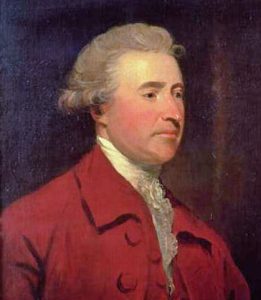
Edmund Burke
The Enlightenment gave us the principle of universal rights, and the notion of political sovereignty based on a democratic mandate from the masses. But many contemporary thinkers were aware of the problems involved. Charles-Louis Montesquieu (1689-1755) stressed the importance of checks and balances in the political system. Edmund Burke (1729-1797) argued that a polity should recognise the wisdom of tradition, as well as the carefully-applied and well-informed guidance of reason.
Burke was astutely aware of the complexities and uncertainties involved in governance. He stressed that members of parliament were there to uphold the interests of the nation as a whole. Decisions had to be reached through detailed discussion and expert advice. Members of parliament were not delegates, to be mandated through the expressed opinions of their constituents.

Thomas Paine
The great radical thinker Thomas Paine (1737-1809) also understood that in larger societies, direct and complete participatory democracy is impossible. Problems of complexity, scale and location place severe limits on democratic involvement. Given the impracticalities of large-scale direct democracy, nations should adopt systems of representative democracy, relying on professional and trained experts in government offices. Paine would have also rejected the ultra-democratic dreamings of some socialists, including Benn and Corbyn.
By contrast, Tony Benn argued that Labour Party Members of Parliament should be mandated by their constituency parties. Corbyn has gone even further in this direction, proposing that party members should dictate policy to their MPs. This undermines a central principle of parliamentary democracy. An important reason for a parliament is that it provides a forum where proposals may be debated, expert advice may be heard and details amended.
The idea that MPs should simply represent the will of their constituents, or be instructed by their local constituency parties, would make parliament redundant. Instead we could all watch television, and as in a game show, express our preferences on every issue, from capital punishment to the expulsion of immigrants. This easily could steam-roller over human rights, and through manipulation serve a dictatorship.
Within a system of representative or parliamentary democracy it is possible to make a case for or against referendums on important issues. In Switzerland referendums are common. Their origins there are in the nineteenth century, where there was a need to keep together a country highly fractured on linguistic, religious and political lines.
Opponents of referendums argue that they can weaken representative democracy. They can be used by the party in power to resolve its internal disputes, or to abdicate responsibility over a difficult decision. The idea that a referendum should be more than advisory rests on a notion of direct rather than representative democracy, and assumes that a large number of voters have the capacity to make an informed decision, untainted by (say) a biased mass media or demagogic leaders. Hence some democratic countries – notably Germany – have legal provisions to limit the use of referendums at the national level.
Conclusion
The current political crisis in the UK has made the nature and role of democracy key issues for discussion and clarification. My first argument here that a leftist strain of ultra-democratic thinking – from Lenin to Corbyn – is untenable. I also argue that democracy and human rights can come into conflict, and when they do the former should submit to the latter.
Ultra-democracy cannot work. Through the frustration of endless committees and meetings, and the collapse of productive activity, attempts to move in this direction would lead to crisis. Unworkable plans for ultra-democracy would both raise and disappoint expectations, leading to the impatience of all, and a likely authoritarian reaction. The road to hell is paved with good intentions.
There are strong practical and moral reasons to support representative democracy, particularly as a means of legitimising government power. The key proviso is that a government should be in principle removable by the electorate – not that the electorate should be the government.
There is strong evidence that representative-democratic systems, where there is some protection of human rights, can reduce the risks of famine and war. Evidence also suggests that democracy may also help economic development, at least for those countries above relatively low levels of output per capita.
I leave it to the reader to deliberate on the pros and cons of holding referendums. The Brexit experience has been illuminating, at least in that regard.
When the Brexit outcome was announced on 24 June, Corbyn immediately declared that the government should take Britain out of the European Union. He was being consistent with his dangerous view that politicians should carry out the orders of the electorate, irrespective of the slim Brexit majority and the lies and false promises in the debate.
30 June 2016
Bibliography
Arrow, Kenneth J. (1951) Social Choice and Individual Values (New York: Wiley).
Benn, Tony (1979) Arguments for Socialism (London: Jonathan Cape).
Benn, Tony (1981) Arguments for Democracy (Harmondsworth: Penguin).
Burke, Edmund (1774) ‘Speech to the Electors of Bristol’. Available on: http://press-pubs.uchicago.edu/founders/documents/v1ch13s7.html
Claeys, Gregory (1989) Thomas Paine: Social and Political Thought (London and New York: Routledge).
Cole, George D. H. (1920) Guild Socialism Re-Stated (London: Parsons).
Michels, Robert (1915) Political Parties: A Sociological Study of Oligarchical Tendencies of Modern Democracy (New York: Hearst).
Polan, Anthony J. (1984) Lenin and the End of Politics (London: Methuen).
Portes, Jonathan (2016) ‘The Condorcet Paradox at Work? Rock-Paper-Scissors in the EU Referendum’, 6 June. http://www.niesr.ac.uk/blog/condorcet-paradox-work-rock-paper-scissors-eu-referendum#.V3IpwU1TF9A
Waldron, Jeremy (1988) The Right to Private Property (Oxford and New York: Oxford University Press).
Wilde, Oscar (2000) Oscar Wilde: A Life in Quotes, ed. Barry Day (London: Metro).
Posted in Brexit, Democracy, Jeremy Corbyn, Uncategorized
May 22nd, 2016 by geoffhodgson1946
Geoffrey M. Hodgson
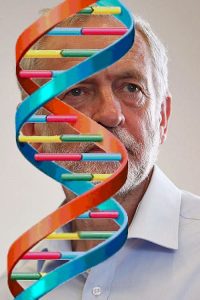 In September 2015 a rank outsider, with minimal support from inside the Parliamentary Party, became Labour Party Leader. But he was elected with the support of almost 60% of the party membership.
In September 2015 a rank outsider, with minimal support from inside the Parliamentary Party, became Labour Party Leader. But he was elected with the support of almost 60% of the party membership.
Jeremy Corbyn first became a Member of Parliament in 1983 and was frequently in opposition to the leadership of his own party. His elevation to Leader in 2015 was widely regarded as a radical break from Labour’s past, particularly from the era of Tony Blair’s leadership from 1994 to 2007.
In contrast to a widespread view, I argue here that Corbyn’s politics are – in most respects – more mainstream than reported. They are broadly in line with the original Labour Party, from its formation in 1900 (as the Labour Representation Committee) to at least 1945.
By contrast, from the election of the first majority Labour government in 1945 to the resignation of Ed Miliband from the leadership in 2015, Labour adjusted to the realities of gaining and retaining power, and became more moderate in much of its political rhetoric. A large section of the party abandoned its original socialist ideology, in substance if not in name, and these pragmatists dominated Labour during the post-war period. To retain credibility, they tried to alter the meaning of socialism to serve more moderate ends.
Corbyn’s election as leader should be understood – in part – as a rehabilitation of typical Labour doctrines of the 1900-1945 period, and of Labour’s aspiration for socialism as originally defined. Corbyn has Labour’s DNA. But he has recombined Labour’s original DNA with ‘anti-imperialist’ doctrines that became prominent, largely outside Labour, in the 1960s and 1970s.
I first summarise Labour Party ideology in the 1900-1945 period. I then show how Corbyn exhibits these earlier views, but in genetic recombination with an “anti-imperialist” politics of the 1960s and 1970s. I then briefly draw some tentative conclusions from this analysis.
Socialism and the Labour Party
The word socialism first appeared in English in 1827 in the Co-operative Magazine, published in London by followers of Robert Owen. It was used in the Poor Man’s Guardian in 1833, and moved into wider usage thereafter.

Robert Owen
For Owen and his followers, socialism meant the abolition of private property. As Owen argued in 1840, ‘virtue and happiness could never be attained’ in ‘any system in which private property was admitted’. He aimed to secure ‘an equality of wealth and rank, by merging all private into public property’.
From the 1830s until the 1950s, socialism was almost universally defined in terms of the abolition of private property and some form of widespread common ownership.
In the Communist Manifesto of 1848, Marx and Engels echoed Owen and others and called for the ‘abolition of private property.’ In 1850 Marx declared: ‘Our concern cannot simply be to modify private property, but to abolish it’. In the Communist Manifesto and elsewhere, he and Engels proclaimed an economic order in which ‘capital is converted into common property, into the property of all members of society.’ They wanted the complete abolition of the ‘free selling and buying’ of commodities.
They welcomed efforts ‘to centralize all instruments of production in the hands of the state’ and looked forward to a time when ‘all production has been concentrated in the hands of a vast association of the whole nation’. Their version of socialism was particularly centralist, but they reflected the views of all socialists in looking for universal common ownership.
Marxism was never a major influence in the British Labour Party. But its founders took on board this same definition of socialism. Socialism was widely understood as the abolition of private ownership and its replacement by some form of common ownership.
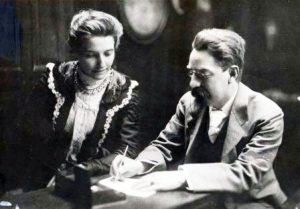
Beatrice & Sidney Webb
Fabian socialists such as Sidney and Beatrice Webb had an ultimate vision of a fully planned and consciously controlled socialist economy where all markets and private ownership of the means of production were gradually marginalized to insignificance. They wanted private ownership of the means of production to be ended: it was a ‘perversion’.
They envisaged a massive, complex structure of national, regional and local committees, all involved in decision-making over details of production and distribution. But how would these cope with the huge amounts of information and specialized knowledge in modern complex economies? It was simply assumed that this was relatively easy to sort out in some rational manner.

G D H Cole
Some contemporary Labour Party intellectuals stressed workplace democracy. This was a central theme in the “guild socialism” of G. D. H. Cole and others. Cole – another Fabian – is sometimes described as a ‘libertarian socialist’ and as an advocate of ‘decentralized’ socialism. But he supported the wholesale nationalisation of industry and the abolition of private enterprise.
Cole’s vision of socialism was of an integrated, national system where ‘a single authority is responsible both for the planning of the social production as a whole and for the distribution of the incomes which will be used in buying it.’ Within this ‘single authority’ he also sought devolved worker control. He wanted local autonomy of manufacturing, modelled on the medieval guild. But he was tragically unclear about how the two were to be reconciled.
These theorists ignored the problem of devolving genuine power within a national bureaucracy, without the creation of autonomous private enterprises. A major debate within the Labour Party concerned the desired structure and devolution of power within this national public framework.
Clause Four, Part Four of the Labour Party Constitution reflected a compromise between these different strands of thought. But all were united in their support of wholesale common ownership. Sidney Webb drafted these words and they were adopted by the Labour Party in 1918:
“To secure for the workers by hand or by brain the full fruits of their industry and the most equitable distribution thereof that may be possible upon the basis of the common ownership of the means of production, distribution and exchange, and the best obtainable system of popular administration and control of each industry or service.”
This provided for no exception: all production would be in common ownership and there would be no private sector. Although some Labour Party thinkers began to entertain the possibility of some private enterprise, resolute support for widespread common ownership prevailed.

Clement Attlee
In 1937, eight years before he became Prime Minister, Clement Attlee wrote of the ‘evils’ of capitalism: their ‘cause is the private ownership of the means of life; the remedy is public ownership.’
Attlee approvingly quoted the words of Bertrand Russell: ‘Socialism means the common ownership of land and capital together with a democratic form of government. … It involves the abolition of all unearned wealth and of all private control over the means of livelihood of the workers’.
After 1945, the position of many leading Labour Party members began to shift. First the realities of gaining and holding on to power – as a majority party for the first time – dramatized the political and practical unfeasibility of abolishing all private enterprise. Some nationalization was achieved, but a large private sector remained.
Second, with the outbreak of the Cold War in 1948 it was more difficult to sustain the naïve, rose-tinted views of the Soviet Union, although as Bill Jones shows in his book The Russia Complex, they were remarkably persistent.
In 1956 C. Anthony Crosland published The Future of Socialism. This underlined Labour’s slow reconciliation with markets, private enterprise and a mixed economy. In 1959 the (West) German Social Democratic Party abandoned the goal of widespread common ownership. In the same year, Hugh Gaitskell tried to get the British Labour Party to follow this lead, but met stiff resistance.
Because of Gaitskell’s failed attempt to change the wording of Clause Four, Corbyn’s mentor Tony Benn switched his allegiance to Harold Wilson. Wilson had been a student of Cole at Oxford University. When he was Prime Minister, Wilson pragmatically retained the clause but tolerated a mixed economy.

Tony Benn
In 1995, Tony Blair successfully ended the Labour Party’s longstanding constitutional commitment to far-reaching common ownership. But Benn still wished to retain the original wording and protested: ‘Labour’s heart is being cut out’.
In an interview in 2000, Benn favourably quoted Attlee: ‘If you look around the world, what are the problems? They’re all caused by the private ownership of the means of production, distribution, and exchange.’
It should be clear that Labour’s commitment to widespread common ownership was uppermost from 1900 to 1945. Subsequently Labour adjusted to the realities of a large-scale complex economy, where it is impossible to gather all information together in some central planning office, or even in some massive computer.
Democratic deliberation over every key decision is even more unfeasible. As Oscar Wilde quipped: socialism is impossible because it would take too many meetings.
In practice, if not in declaration, every leader of the Labour Party from 1955 to 2015 had abandoned the commitment to wholesale common ownership. But as Benn and Corbyn have illustrated so well, it has remained in Labour’s DNA.
A tricky gene transplant might have been possible, but only if Labour had developed a thoroughgoing alternative to its pre-1945 socialism. The closest it came to this was Crosland’s Future of Socialism, which commendably emphasized the goal of diminishing economic inequality, instead of common ownership.
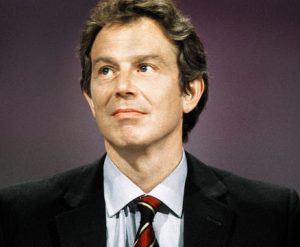
Tony Blair
But largely the party fudged the issue, trying to turn the original meaning of socialism (which had prevailed from 1830 to 1950) into something else. Even Blair retained the word socialism in his rhetoric and in his redraft of Clause Four.
Blair promoted ‘social-ism’, which now meant recognizing individuals as socially interdependent. It also signalled social justice, cohesion, and the equal worth of each citizen, with equal opportunities.
Such a doctrine was indistinguishable from the earlier views of radical social liberals, such as T. H. Green and J. A. Hobson. It was a hundred miles away from the collectivism of Owen, Cole or the Webbs. But (with or without the hyphen) the word socialism was retained.
Blair favoured the tradition of ‘ethical socialism’ naming proponents such as John Macmurray and R. H. Tawney. But he wrongly stated that these socialists had been opposed to common ownership. On the contrary, their original devotion to this goal was no less than that of Owenism or Marxism, although Tawney and others later adjusted their views.
Instead of tackling the problem of its collectivist DNA more explicitly and resolutely, Labour tried to change the meaning of socialism and even rewrote parts of its own history. It is unsurprising that the old DNA survived.
Genetic Recombination with ‘Anti-Imperialism’
The late 1960s and early 1970s were years of great political convulsion. At the centre was opposition to the War in Vietnam. Previously most hard-left groups – including the forerunner of today’s Socialist Workers Party – were ‘entryists’ in the Labour Party. Before 1968 it was the only place to be. But the Vietnam War changed all that.
As British Prime Minister, Wilson declared government support for the military actions of the United States in Vietnam, but astutely avoided sending British troops. By 1968 the Labour Party conference had come out against the war. Wilson personally bore the brunt of the opposition. Thousands of activists left the Labour Party. Most of the hard-left sects followed them.
 From 1920 to 1968 the main socialist party outside Labour was the Communist Party of Great Britain. After 1968 they were competing in this narrow space with several feuding and splintering Trotskyist groups.
From 1920 to 1968 the main socialist party outside Labour was the Communist Party of Great Britain. After 1968 they were competing in this narrow space with several feuding and splintering Trotskyist groups.
It was Lenin, not Marx, who had made ‘anti-imperialism’ and national liberation a key motif of his Marxism. He was followed in this respect by Trotsky.
Hence Leninism once again became visible on the far left. But this time it did not necessarily mean loyalty to the Soviet Union: it mean ‘solidarity with anti-imperialist struggles’ in Cuba, Vietnam, Palestine and elsewhere.
Corbyn was 19 years old in 1968. Politically, these were his formative years. Unlike many others he remained in the Labour Party, partly attracted by the ideas and charisma of Benn, who narrowly lost the contest for deputy leadership against Dennis Healey in 1981. Corbyn’s unwavering views, his election as an MP in 1983 and his political survival until his triumphant bid for leadership in 2015, has spliced Leninist genes alongside those of the old Owenite collectivism.
Blair’s invasion of Iraq in 2003 and the financial crash of 2008 had helped to turn the Labour membership against Blairism, in all its forms and dilutions. As evidence of the Freudian defence mechanism of regression as a response to severe stress, Labour reverted to an earlier stage of development, adopting its infant profile of collectivism and state control.
Labour’s ‘Russia complex’ also re-emerged. We can find sympathy with a post-Soviet Russia, in disputes over the Ukraine and the expansion of NATO.
Labour’s Future?
Labour’s enduring successes in 1945-51, 1964-1970, 1974-1979 and 1997-2010 were great liberal reforms and extensions of social justice, from the National Health Service to the minimum wage. They did not bring a mythical socialist future any closer. Labour advanced despite, not because of, its original socialism.
Recent developments within the Labour Party – including the resurgence of its collectivist past – make a parliamentary majority in 2020 impossible, unless some unforeseen catastrophe hits the Conservative Party. A recent report from within the Labour Party states that unless radical action is taken, Labour’s electoral prospects ‘remain very poor’.
 Any way we look, the outlook is bleak. The election of Corbyn to Labour Party Leader shows that organizations have something similar to the enduring DNA of biological organisms. As business practitioners know well, changing organizational DNA is notoriously difficult.
Any way we look, the outlook is bleak. The election of Corbyn to Labour Party Leader shows that organizations have something similar to the enduring DNA of biological organisms. As business practitioners know well, changing organizational DNA is notoriously difficult.
Later posts on this New Politics blog will address this problem and try to formulate some solutions. But we should not underestimate the scale of the task ahead. One of the first jobs for the Left is to reconsider where it has come from, and what kind of future it wishes to build. Nothing should be taken for granted.
But this ‘DNA’ analysis shows that the status of the Labour Party in Britain as the leader of a renewed and viable Left is now in doubt.
23 May 2016
Bibliography
Attlee, Clement R. (1937) The Labour Party in Perspective (London: Gollancz).
Blair, Tony (1994) Socialism, Fabian Pamphlet 565 (London: Fabian Society).
Cole, George D. H. (1920) Guild Socialism Re-Stated (London: Parsons).
Crosland, C. Anthony R. (1956) The Future of Socialism (London: Jonathan Cape).
Hodgson, Geoffrey M. (1999) Economics and Utopia: Why the Learning Economy is not the End of History (London and New York: Routledge).
Jones, Bill (1977) The Russia Complex: The British Labour Party and the Soviet Union (Manchester: University of Manchester Press).
Marx, Karl (1973) The Revolutions of 1848: Political Writings – Volume 1 (Harmondsworth: Penguin).
Owen, Robert (1991) A New View of Society and Other Writings (Harmondsworth: Penguin).
Webb, Sidney J. and Webb, Beatrice (1920) A Constitution for the Socialist Commonwealth of Great Britain (London: Longmans Green).
Posted in Common ownership, Jeremy Corbyn, Labour Party, Nationalization, Politics, Robert Owen, Socialism, Tony Benn, Tony Blair

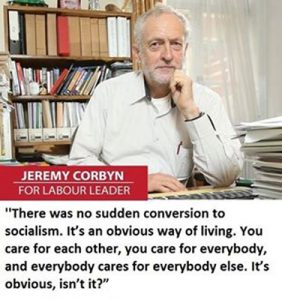 Here is my own confession: fifty years ago I believed that socialism was ‘obvious’. Eventually I was persuaded otherwise. Initially, it was not my growing awareness of the horrendous consequences of the socialist experiments in Russia, China and elsewhere that jolted me.
Here is my own confession: fifty years ago I believed that socialism was ‘obvious’. Eventually I was persuaded otherwise. Initially, it was not my growing awareness of the horrendous consequences of the socialist experiments in Russia, China and elsewhere that jolted me.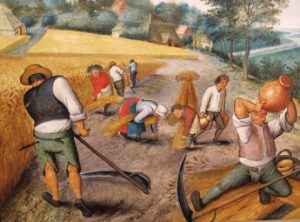 Nobel Laureate Elinor Ostrom studied the management of common-pool resources – such as medieval common land, fisheries or agricultural irrigation schemes – and showed how they can be effectively managed by relatively small local communities.
Nobel Laureate Elinor Ostrom studied the management of common-pool resources – such as medieval common land, fisheries or agricultural irrigation schemes – and showed how they can be effectively managed by relatively small local communities.
 Corbyn is right:
Corbyn is right:  There is a need for rules, monitoring and countervailing power. If all economic power is concentrated in the bureaucracy of planners, then will be no effective alternative power that can countervail.
There is a need for rules, monitoring and countervailing power. If all economic power is concentrated in the bureaucracy of planners, then will be no effective alternative power that can countervail. The great American politician Robert F. Kennedy once said:
The great American politician Robert F. Kennedy once said: Even small successes –
Even small successes – 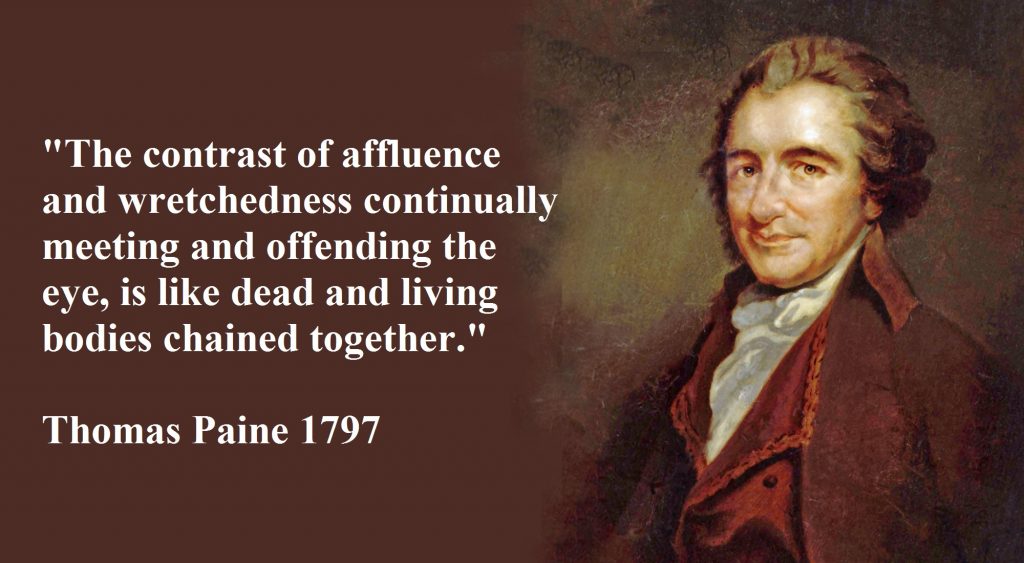
 Given the huge and growing inequalities within modern capitalism, this focus on inequality is a positive move. But concern about inequality has never been confined to socialism. Ritual incantation of the aim for a ‘socialist’ future within the Labour Party may divert attention from measures that can be implemented within capitalism and without widespread common ownership.
Given the huge and growing inequalities within modern capitalism, this focus on inequality is a positive move. But concern about inequality has never been confined to socialism. Ritual incantation of the aim for a ‘socialist’ future within the Labour Party may divert attention from measures that can be implemented within capitalism and without widespread common ownership.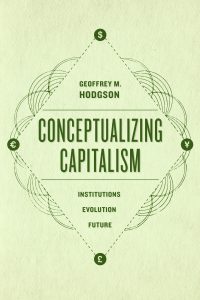 Although economic inequality is endemic to capitalism, data gathered by Thomas Piketty in his Capital in the Twentieth Century, and by me in my book entitled Conceptualizing Capitalism, show that there are large variations in measures of inequality in different major capitalist countries, and through time. The existence of such variety within capitalism suggests that it possible to alleviate inequality, to a significant degree, within capitalism itself.
Although economic inequality is endemic to capitalism, data gathered by Thomas Piketty in his Capital in the Twentieth Century, and by me in my book entitled Conceptualizing Capitalism, show that there are large variations in measures of inequality in different major capitalist countries, and through time. The existence of such variety within capitalism suggests that it possible to alleviate inequality, to a significant degree, within capitalism itself. Because waged employees are not slaves, they cannot use their lifetime capacity for work as collateral to obtain money loans. The very commercial freedom of workers denies them the possibility to use their labour assets or skills as collateral.
Because waged employees are not slaves, they cannot use their lifetime capacity for work as collateral to obtain money loans. The very commercial freedom of workers denies them the possibility to use their labour assets or skills as collateral.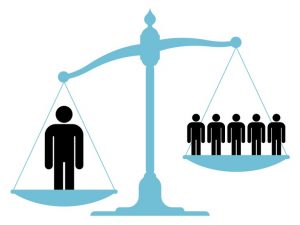 Today we face problems of inequality even greater than those addressed by Paine. In the USA, the richest 1 per cent own 34 per cent of the wealth and the richest 10 per cent own 74 per cent of the wealth. In the UK, the richest 1 per cent own 12 per cent of the wealth and the richest 10 per cent own 44 per cent of the wealth. In France the figures are 24 cent and 62 per cent respectively. The richest 1 percent own 35 percent of the wealth in Switzerland, 24 per cent in Sweden and 15 percent in Canada.
Today we face problems of inequality even greater than those addressed by Paine. In the USA, the richest 1 per cent own 34 per cent of the wealth and the richest 10 per cent own 74 per cent of the wealth. In the UK, the richest 1 per cent own 12 per cent of the wealth and the richest 10 per cent own 44 per cent of the wealth. In France the figures are 24 cent and 62 per cent respectively. The richest 1 percent own 35 percent of the wealth in Switzerland, 24 per cent in Sweden and 15 percent in Canada. To this end, home ownership is of positive value, as a means of widely extending ownership of collateralizable property. But there also needs to be a substantial amount of social housing available for rent, to cater for those unable to afford to buy their own homes.
To this end, home ownership is of positive value, as a means of widely extending ownership of collateralizable property. But there also needs to be a substantial amount of social housing available for rent, to cater for those unable to afford to buy their own homes. Increased wealth or inheritance taxes are likely to be unpopular because they are perceived as an attack on the wealth that we have built up and wish to pass on to our children or others of our choice. But the brilliance of Paine’s 1797 proposal for a cash grant at the age of majority is that it offers a quid-pro-quo for wealth or inheritance taxes at later life.
Increased wealth or inheritance taxes are likely to be unpopular because they are perceived as an attack on the wealth that we have built up and wish to pass on to our children or others of our choice. But the brilliance of Paine’s 1797 proposal for a cash grant at the age of majority is that it offers a quid-pro-quo for wealth or inheritance taxes at later life.

 The Association of the British Pharmaceutical Industry (ABPI) – the trade association for over 120 UK companies producing prescription medicines – quickly responded with a statement questioning Corbyn’s judgement in this area.
The Association of the British Pharmaceutical Industry (ABPI) – the trade association for over 120 UK companies producing prescription medicines – quickly responded with a statement questioning Corbyn’s judgement in this area.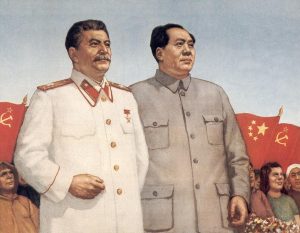 Innovation depends on hunches about the future. Successful innovation takes into account local, tacit and other knowledge concerning circumstances and possibilities. Much of this knowledge involves complex details and contexts, and cannot all be brought together and utilized by a central committee or planning authority.
Innovation depends on hunches about the future. Successful innovation takes into account local, tacit and other knowledge concerning circumstances and possibilities. Much of this knowledge involves complex details and contexts, and cannot all be brought together and utilized by a central committee or planning authority. In 1978 some Chinese peasant farmers decided to withdraw from collective farms and take responsibility for production at the household level, where the household (instead of the collective) received the revenue from its sold output. Individual households had much greater incentives to work harder and to innovate. After decades of slow growth under Mao, China’s explosive economic growth began with those changes in rural areas. As a result, unprecedented millions were lifted out of poverty.
In 1978 some Chinese peasant farmers decided to withdraw from collective farms and take responsibility for production at the household level, where the household (instead of the collective) received the revenue from its sold output. Individual households had much greater incentives to work harder and to innovate. After decades of slow growth under Mao, China’s explosive economic growth began with those changes in rural areas. As a result, unprecedented millions were lifted out of poverty.







 For example, Blair’s emphasis on ‘values and beliefs’ over institutional structures allowed him to privatize some public services, including parts of the National Health Service. His claim was that the same esteemed values could endure within any system of ownership. But changes to institutional structures affect the habits and beliefs of those involved. Extending the scope for contracts and markets means – rightly or wrongly – that pecuniary and profit-orientated values can become more pervasive, unless checks are put in place.
For example, Blair’s emphasis on ‘values and beliefs’ over institutional structures allowed him to privatize some public services, including parts of the National Health Service. His claim was that the same esteemed values could endure within any system of ownership. But changes to institutional structures affect the habits and beliefs of those involved. Extending the scope for contracts and markets means – rightly or wrongly – that pecuniary and profit-orientated values can become more pervasive, unless checks are put in place. David Bell – the then Chief Inspector of Schools – warned in a January 2005 speech to the Hansard Society that
David Bell – the then Chief Inspector of Schools – warned in a January 2005 speech to the Hansard Society that  Blair’s motivation for his decision to support Bush’s invasion will be the subject of many biographies and histories to come. The explanation is bound to be complex, but I guess that Blair’s supreme emphasis on ‘values’ over legalities, structures, evidence, fallibilities and practicalities will be uppermost. How else could someone believe in the possibility that Western democratic ideals could quickly take hold in an artificially-created country with no democratic history, riven by ethnic and religious division and fragmented into countless clans?
Blair’s motivation for his decision to support Bush’s invasion will be the subject of many biographies and histories to come. The explanation is bound to be complex, but I guess that Blair’s supreme emphasis on ‘values’ over legalities, structures, evidence, fallibilities and practicalities will be uppermost. How else could someone believe in the possibility that Western democratic ideals could quickly take hold in an artificially-created country with no democratic history, riven by ethnic and religious division and fragmented into countless clans? As if oblivious to the enormous changes in world capitalism, Corbyn clings to an ideology made in 1918. There is neither strategy, detail nor appraisal of feasibilty, to his thinking. All that is left is his ‘values’: his outrage and protest against forces from the West that inflict suffering on the world. There is no mention of the many millions that have died under regimes that were ‘Marxist-Leninist’ by name.
As if oblivious to the enormous changes in world capitalism, Corbyn clings to an ideology made in 1918. There is neither strategy, detail nor appraisal of feasibilty, to his thinking. All that is left is his ‘values’: his outrage and protest against forces from the West that inflict suffering on the world. There is no mention of the many millions that have died under regimes that were ‘Marxist-Leninist’ by name.






 In September 2015 a rank outsider, with minimal support from inside the Parliamentary Party, became Labour Party Leader. But he was elected with the support of almost 60% of the party membership.
In September 2015 a rank outsider, with minimal support from inside the Parliamentary Party, became Labour Party Leader. But he was elected with the support of almost 60% of the party membership.



 From 1920 to 1968 the main socialist party outside Labour was the Communist Party of Great Britain. After 1968 they were competing in this narrow space with several feuding and splintering Trotskyist groups.
From 1920 to 1968 the main socialist party outside Labour was the Communist Party of Great Britain. After 1968 they were competing in this narrow space with several feuding and splintering Trotskyist groups. Any way we look, the outlook is bleak. The election of Corbyn to Labour Party Leader shows that organizations have something similar to the enduring DNA of biological organisms. As business practitioners know well, changing organizational DNA is notoriously difficult.
Any way we look, the outlook is bleak. The election of Corbyn to Labour Party Leader shows that organizations have something similar to the enduring DNA of biological organisms. As business practitioners know well, changing organizational DNA is notoriously difficult.